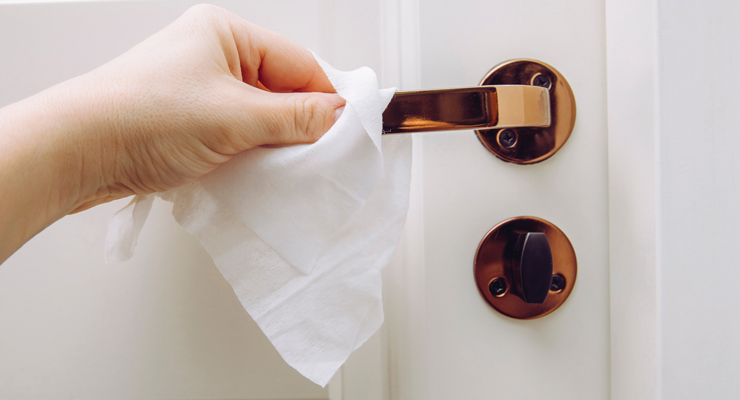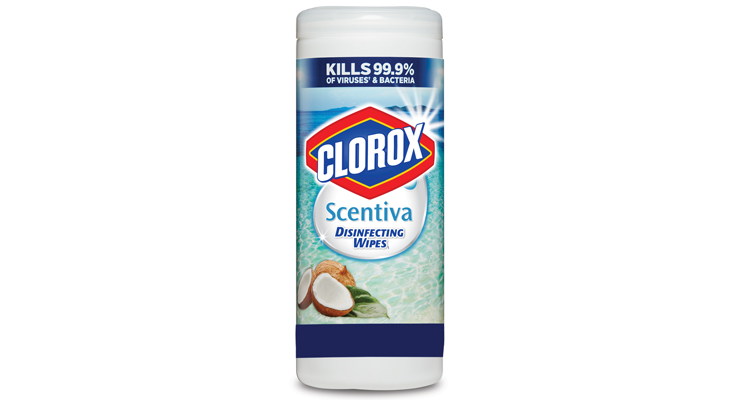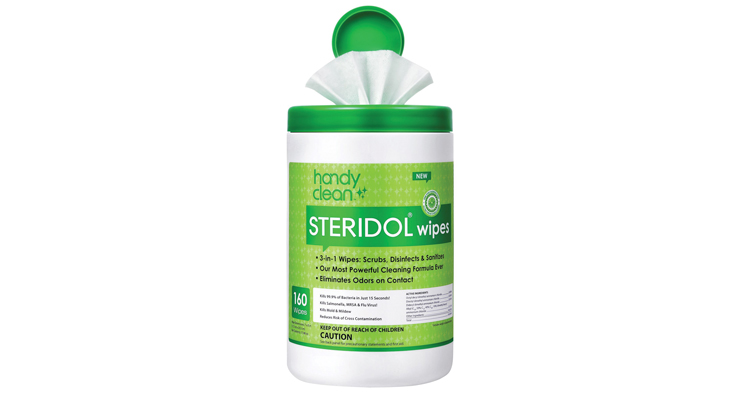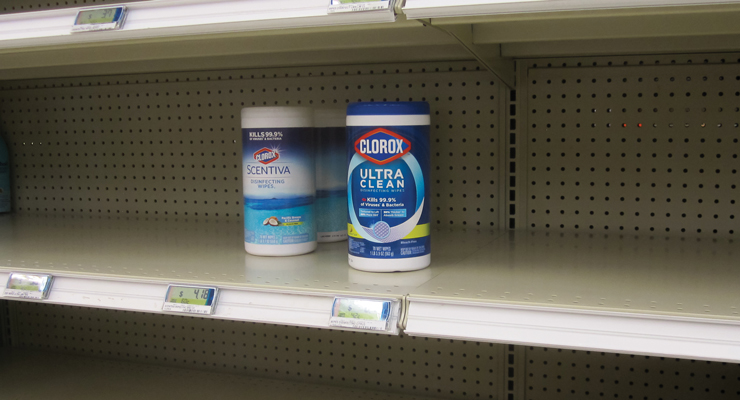Tara Olivo, Associate Editor06.10.20
Household and disinfectant wipes are hard to come by these days. As the number of cases of the novel coronavirus began to climb quickly in the U.S. in March, worried consumers began pantry-loading supplies like household cleaners and disinfectants, including wipes. For months, shelves have been emptied of these products, and when they are restocked, they’re gone within the hour.
“This is unprecedented demand in modern times for products like disinfecting wipes,” says Brian Sansoni, senior vice president, Communications, Outreach & Membership for The American Cleaning Institute (ACI), a U.S.-based trade association for the cleaning products industry. “Manufacturers have been working around the clock as they are able to get as many workers in there—working safely as well, as the safety of the workforce is paramount.”
Based on reports and analysis from manufacturers, the ACI estimates that consumers will begin to see a more regular supply of products like disinfectant wipes in mid-summer.
Major manufacturers of disinfectants and disinfectant wipes weren’t quite prepared for such high demand this time of year.
On The Clorox Company’s earnings call last month, chairman and CEO Benno Dorer reported that the company had all-time record shipments of Clorox disinfecting wipes, cleanup disinfecting spray, disinfecting bathroom cleaner and Scentiva products. Demand for some disinfectant products spiked more than 500%. “Demand has been clearly unprecedented,” he said.
Dorer told analysts that the company has been able to increase production of disinfecting products by 40%. It’s now focusing on fewer SKUs; production of its line of Clorox compostable cleaning wipes is on hold for now in order to prioritize disinfecting wipes.
Clorox has also activated third-party suppliers to help it cope with the surge in demand. “We continue to find new ways to increase our capacity,” he added.
In terms of availability, Dorer told Yahoo! Finance last month that there will be substantial improvements in supply this summer. “It’s going to be touch and go until then, unfortunately. But help is on the way, and I think things should ease up in the next few months.”
Reckitt Benckiser’s (RB) Lysol brand, Clorox’s main competitor, is also reporting strong category growth driven by conditions created by Covid-19. In the first quarter of 2020, North America Like-for Like (LFL) revenue was up 20% in the quarter, with Lysol especially strong, up over 50%, due to Covid-19 demand.
Commenting on the company’s results, Laxman Narasimhan, RB chief executive officer, said: “We are living in unprecedented times...despite the significant pressures presented by Covid-19, our global teams have worked around the clock to ensure continuity of supply, while prioritizing the safety of our employees, partners and the communities where we live and work.”
The exceptional demand resulted in some customers and consumers facing shortages for some of its products, Narasimhan added. In response RB has ramped up production, streamlined its SKUs and is working with customers and suppliers to overcome significant barriers, while incurring additional costs. “I am incredibly grateful to all our employees, and also to our partners and customers for their patience as we work to increase supply to meet the unprecedented demand,” he added.
Ramping Up
To alleviate shortages caused by consumer stockpiling, wipes manufacturers have been working as quickly and safely as possible to crank up capacity.
“Companies certainly ramped up production to meet the demand, while retailers have been seeking to normalize the supply situation by restricting purchases per customer,” says Svetlana Uduslivaia, head of Home and Tech Americas at Euromonitor International. “As stay-at-home restrictions ease and some of the at-home consumption normalizes, coupled with ramped up production, the situation will likely normalize in retail.”
The increased demand for disinfectant wipes and hand sanitizing products has required California-based wipes manufacturer Diamond Wipes International to shift its production efforts to these products and launch new disinfecting wipes products, according to chief executive officer Lance Leonard. “Balancing this with ongoing projects for our contract packaging and retail partners has become somewhat challenging but not unmanageable,” he says.
Prior to the pandemic, the household wipes category represented a small portion of Diamond Wipes’ sales. With the onset of covid-19, however, demand for household surface disinfecting wipes increased significantly and in July the manufacturer is launching new household disinfecting wipes through its Handyclean Wipes by Diamond Wipes brand. The wipes kill 99.9% of bacteria and viruses and sanitize household surfaces in 15 seconds and will be available in 35 and 75 count canisters.
“The amount of orders and inquiries for all our disinfecting products have increased exponentially,” Leonard says.
Products such as its Steridol Wipes, which can be claimed effective against the coronavirus, and Diamond Wipes’ hand sanitizing wipes and gels are equally popular, he adds.
In addition to canisters, pouches and individual packets, the company’s jumbo rolls of disinfecting wipes are in high demand by gyms, health facilities and warehouse/distribution centers. “I believe making our products in the U.S. is a major factor as Diamond Wipes can react more quickly to these requests and the pandemic is also negatively affecting overseas production,” Leonard says.
A key challenge, Leonard admits, is working with outside suppliers of film, substrates and outer packaging as they are experiencing the same upsurge in demand. “This has forced us to become nimbler. For example, if canisters won’t be available by our due date, we will switch to a foil pack to meet the demand.”
Wipes manufacturer KleenTest Products is also observing unprecedented demand for disinfectant wipes. “Given our long history as a wipes producer, we have been through multiple pandemic demand surges, but this time is different,” says Doug Arnold, senior vice president, KleenTest Products.
KleenTest has responded by adding additional shifts and expediting new equipment installations. “The instantaneous demand created by covid-19 was beyond what the industry as a whole could service,” Arnold adds. “The supply chain stresses were not only with wipes manufacturers but also with suppliers of nonwovens, packaging and formula ingredients. Given the global nature of the pandemic, the entire world was searching for product at the same time. Market demand is currently outpacing supply. However, everyone in the industry is working hard to bring that back into balance.”
Rockline Industries, a manufacturer of private label household disinfecting wipes in the U.S., has been in constant communication with its customers about how they could deliver more disinfectant products to them during the outbreak.
“Nielsen HomeScan data taken prior to the covid-19 pandemic indicated that disinfecting wipes were a staple item in roughly 50% of U.S. homes, while some more recent data obtained since the outbreak indicates that household penetration may have jumped as high as 79%,” says Chris Dresselhuys, director of Product Management & Marketing, Rockline Industries. “The critical thing to understand is that every 1% increase in household penetration represents an additional 1.4 million homes that are now buying the category, this is a very large and very sudden increase in demand for a category that previously had a relatively steady growth curve.”
Rockline has made several moves that increased capacity. First it collaborated with its retail partners by focusing on product assortments that increased through-put. Additionally, the company adjusted work schedules, line loading and supply chains to focus on disinfectant production. Lastly, while small in comparison to the canister wipes, Rockline created new versions in flexible film to maximize all converting assets. The flexible film packages will be coming to the market soon, Dresselhuys says.
“Inventories in the market saw a very rapid and unprecedented depletion in mid-March when the quarantine began and consumers pantry-loaded products. We are running full tilt to replenish those inventories,” Dresselhuys says. “All of our raw material suppliers have been fantastic in helping us to find innovative ways to keep product flowing to consumers.”
Wet wipes producer Nice-Pak, meanwhile, is among the first to test its products for efficacy against SARS-CoV-2, the virus that causes covid-19. The company is partnering with Microbac, a globally recognized contract testing laboratory, for testing.
Nice-Pak’s disinfectant products currently sold under the Nice ‘N Clean and Grime Boss brands (EPA Reg. No. 9480-5), as well as private labels, are on the EPA’s List N: Disinfectants for Use Against SARS-CoV-2 and have been essential products in high demand since the covid-19 outbreak began. These products will undergo important testing to demonstrate effectiveness against the novel coronavirus.
“Nice-Pak, who developed and commercialized the first disinfecting surface wipes, has been at the forefront of innovation for decades and continues to advance our offerings – which includes testing of current and emerging pathogens – as the need for disinfecting and cleaning products continues to increase,” says Jim Dalton, vice president and head of Research & Development, Nice-Pak. “Our partnership with Microbac will help us generate the necessary data for submission to the EPA to support claims against SARS-CoV-2, and ensure that our products offer effective solutions to keep people healthy.”
This partnership comes in parallel with sister-company, PDI, which announced its products, used in healthcare, foodservice and other professional environments, are also being tested against the virus by Microbac.
Microbac is a premier contract testing laboratory that offers antimicrobial/antiviral testing for disinfectants, antiseptics, sanitizers and medical devices. It is one of the only testing laboratories in the U.S. with the required experience and capabilities to test the efficacy of disinfectants against the SARS-CoV-2 virus.
“Protecting the public and frontline healthcare workers against SARS-CoV-2 is an all-hands-on-deck issue,” says Trevor Boyce, Microbac’s chairman and CEO. “We look forward to applying our scientific knowledge and experience as we work with global wet wipes producers like Nice-Pak to develop new tools in the fight against this pandemic.”
“Nice-Pak employees have been working around the clock since the very beginning of the outbreak to ensure our customers can get the wet wipe products they need,” says Robert Julius, CEO of Nice-Pak. “We are deeply thankful for and proud of all our dedicated employees – from the researchers in the labs to the people on the factory floor – who have worked tirelessly through this pandemic.”
Changing Habits
Although more consumers today see the value and convenience of household wipes, the pricier cleaning format is still considered a luxury item to many as compared to other cleaning formats. But will the current economic pain being felt by much of the population impact the household cleaning and wipes markets like it did during another recent economic downturn, the Great Recession? Market researcher Mintel has identified a key difference between the two.
“The Great Recession drove economizing behavior in nearly every CPG category,” explains Jamie Rosenberg, senior global analyst, Household & Personal Care, Mintel. “Consumers viewed cleaning products as a platform to reduce overall household expenditures and that was evident in market performance. The household cleaning category declined during the recession and did not post positive growth until 2012.”
On the other hand, covid-19 is having a unequivocally different effect on different product categories. “In particular, the pandemic is elevating the status of household cleaning products. Cleanliness has always been important, but cleaning products are now part of consumers’ survival strategy because in the era of the pandemic, lax germ management can lead to negative health consequences,” he adds.
According to Mintel, wipes are already the fastest-growing surface cleaning format. Due to the pandemic, Mintel analysts predict there will be an additional wave of fast-tracking because wipes represent the quickest route to sanitizing a surface after human contact.
The market researcher also found that while wipes outgrew the broader surface-cleaning category last year, store brands walked away with most of that growth. “Greater affordability along with the virus-driven need for quick cleaning will grow penetration of household wipes during the pandemic and beyond,” Rosenberg says.
“This is unprecedented demand in modern times for products like disinfecting wipes,” says Brian Sansoni, senior vice president, Communications, Outreach & Membership for The American Cleaning Institute (ACI), a U.S.-based trade association for the cleaning products industry. “Manufacturers have been working around the clock as they are able to get as many workers in there—working safely as well, as the safety of the workforce is paramount.”
Based on reports and analysis from manufacturers, the ACI estimates that consumers will begin to see a more regular supply of products like disinfectant wipes in mid-summer.
Major manufacturers of disinfectants and disinfectant wipes weren’t quite prepared for such high demand this time of year.
On The Clorox Company’s earnings call last month, chairman and CEO Benno Dorer reported that the company had all-time record shipments of Clorox disinfecting wipes, cleanup disinfecting spray, disinfecting bathroom cleaner and Scentiva products. Demand for some disinfectant products spiked more than 500%. “Demand has been clearly unprecedented,” he said.
Dorer told analysts that the company has been able to increase production of disinfecting products by 40%. It’s now focusing on fewer SKUs; production of its line of Clorox compostable cleaning wipes is on hold for now in order to prioritize disinfecting wipes.
Clorox has also activated third-party suppliers to help it cope with the surge in demand. “We continue to find new ways to increase our capacity,” he added.
In terms of availability, Dorer told Yahoo! Finance last month that there will be substantial improvements in supply this summer. “It’s going to be touch and go until then, unfortunately. But help is on the way, and I think things should ease up in the next few months.”
Reckitt Benckiser’s (RB) Lysol brand, Clorox’s main competitor, is also reporting strong category growth driven by conditions created by Covid-19. In the first quarter of 2020, North America Like-for Like (LFL) revenue was up 20% in the quarter, with Lysol especially strong, up over 50%, due to Covid-19 demand.
Commenting on the company’s results, Laxman Narasimhan, RB chief executive officer, said: “We are living in unprecedented times...despite the significant pressures presented by Covid-19, our global teams have worked around the clock to ensure continuity of supply, while prioritizing the safety of our employees, partners and the communities where we live and work.”
The exceptional demand resulted in some customers and consumers facing shortages for some of its products, Narasimhan added. In response RB has ramped up production, streamlined its SKUs and is working with customers and suppliers to overcome significant barriers, while incurring additional costs. “I am incredibly grateful to all our employees, and also to our partners and customers for their patience as we work to increase supply to meet the unprecedented demand,” he added.
Ramping Up
To alleviate shortages caused by consumer stockpiling, wipes manufacturers have been working as quickly and safely as possible to crank up capacity.
“Companies certainly ramped up production to meet the demand, while retailers have been seeking to normalize the supply situation by restricting purchases per customer,” says Svetlana Uduslivaia, head of Home and Tech Americas at Euromonitor International. “As stay-at-home restrictions ease and some of the at-home consumption normalizes, coupled with ramped up production, the situation will likely normalize in retail.”
The increased demand for disinfectant wipes and hand sanitizing products has required California-based wipes manufacturer Diamond Wipes International to shift its production efforts to these products and launch new disinfecting wipes products, according to chief executive officer Lance Leonard. “Balancing this with ongoing projects for our contract packaging and retail partners has become somewhat challenging but not unmanageable,” he says.
Prior to the pandemic, the household wipes category represented a small portion of Diamond Wipes’ sales. With the onset of covid-19, however, demand for household surface disinfecting wipes increased significantly and in July the manufacturer is launching new household disinfecting wipes through its Handyclean Wipes by Diamond Wipes brand. The wipes kill 99.9% of bacteria and viruses and sanitize household surfaces in 15 seconds and will be available in 35 and 75 count canisters.
“The amount of orders and inquiries for all our disinfecting products have increased exponentially,” Leonard says.
Products such as its Steridol Wipes, which can be claimed effective against the coronavirus, and Diamond Wipes’ hand sanitizing wipes and gels are equally popular, he adds.
In addition to canisters, pouches and individual packets, the company’s jumbo rolls of disinfecting wipes are in high demand by gyms, health facilities and warehouse/distribution centers. “I believe making our products in the U.S. is a major factor as Diamond Wipes can react more quickly to these requests and the pandemic is also negatively affecting overseas production,” Leonard says.
A key challenge, Leonard admits, is working with outside suppliers of film, substrates and outer packaging as they are experiencing the same upsurge in demand. “This has forced us to become nimbler. For example, if canisters won’t be available by our due date, we will switch to a foil pack to meet the demand.”
Wipes manufacturer KleenTest Products is also observing unprecedented demand for disinfectant wipes. “Given our long history as a wipes producer, we have been through multiple pandemic demand surges, but this time is different,” says Doug Arnold, senior vice president, KleenTest Products.
KleenTest has responded by adding additional shifts and expediting new equipment installations. “The instantaneous demand created by covid-19 was beyond what the industry as a whole could service,” Arnold adds. “The supply chain stresses were not only with wipes manufacturers but also with suppliers of nonwovens, packaging and formula ingredients. Given the global nature of the pandemic, the entire world was searching for product at the same time. Market demand is currently outpacing supply. However, everyone in the industry is working hard to bring that back into balance.”
Rockline Industries, a manufacturer of private label household disinfecting wipes in the U.S., has been in constant communication with its customers about how they could deliver more disinfectant products to them during the outbreak.
“Nielsen HomeScan data taken prior to the covid-19 pandemic indicated that disinfecting wipes were a staple item in roughly 50% of U.S. homes, while some more recent data obtained since the outbreak indicates that household penetration may have jumped as high as 79%,” says Chris Dresselhuys, director of Product Management & Marketing, Rockline Industries. “The critical thing to understand is that every 1% increase in household penetration represents an additional 1.4 million homes that are now buying the category, this is a very large and very sudden increase in demand for a category that previously had a relatively steady growth curve.”
Rockline has made several moves that increased capacity. First it collaborated with its retail partners by focusing on product assortments that increased through-put. Additionally, the company adjusted work schedules, line loading and supply chains to focus on disinfectant production. Lastly, while small in comparison to the canister wipes, Rockline created new versions in flexible film to maximize all converting assets. The flexible film packages will be coming to the market soon, Dresselhuys says.
“Inventories in the market saw a very rapid and unprecedented depletion in mid-March when the quarantine began and consumers pantry-loaded products. We are running full tilt to replenish those inventories,” Dresselhuys says. “All of our raw material suppliers have been fantastic in helping us to find innovative ways to keep product flowing to consumers.”
Wet wipes producer Nice-Pak, meanwhile, is among the first to test its products for efficacy against SARS-CoV-2, the virus that causes covid-19. The company is partnering with Microbac, a globally recognized contract testing laboratory, for testing.
Nice-Pak’s disinfectant products currently sold under the Nice ‘N Clean and Grime Boss brands (EPA Reg. No. 9480-5), as well as private labels, are on the EPA’s List N: Disinfectants for Use Against SARS-CoV-2 and have been essential products in high demand since the covid-19 outbreak began. These products will undergo important testing to demonstrate effectiveness against the novel coronavirus.
“Nice-Pak, who developed and commercialized the first disinfecting surface wipes, has been at the forefront of innovation for decades and continues to advance our offerings – which includes testing of current and emerging pathogens – as the need for disinfecting and cleaning products continues to increase,” says Jim Dalton, vice president and head of Research & Development, Nice-Pak. “Our partnership with Microbac will help us generate the necessary data for submission to the EPA to support claims against SARS-CoV-2, and ensure that our products offer effective solutions to keep people healthy.”
This partnership comes in parallel with sister-company, PDI, which announced its products, used in healthcare, foodservice and other professional environments, are also being tested against the virus by Microbac.
Microbac is a premier contract testing laboratory that offers antimicrobial/antiviral testing for disinfectants, antiseptics, sanitizers and medical devices. It is one of the only testing laboratories in the U.S. with the required experience and capabilities to test the efficacy of disinfectants against the SARS-CoV-2 virus.
“Protecting the public and frontline healthcare workers against SARS-CoV-2 is an all-hands-on-deck issue,” says Trevor Boyce, Microbac’s chairman and CEO. “We look forward to applying our scientific knowledge and experience as we work with global wet wipes producers like Nice-Pak to develop new tools in the fight against this pandemic.”
“Nice-Pak employees have been working around the clock since the very beginning of the outbreak to ensure our customers can get the wet wipe products they need,” says Robert Julius, CEO of Nice-Pak. “We are deeply thankful for and proud of all our dedicated employees – from the researchers in the labs to the people on the factory floor – who have worked tirelessly through this pandemic.”
Changing Habits
Although more consumers today see the value and convenience of household wipes, the pricier cleaning format is still considered a luxury item to many as compared to other cleaning formats. But will the current economic pain being felt by much of the population impact the household cleaning and wipes markets like it did during another recent economic downturn, the Great Recession? Market researcher Mintel has identified a key difference between the two.
“The Great Recession drove economizing behavior in nearly every CPG category,” explains Jamie Rosenberg, senior global analyst, Household & Personal Care, Mintel. “Consumers viewed cleaning products as a platform to reduce overall household expenditures and that was evident in market performance. The household cleaning category declined during the recession and did not post positive growth until 2012.”
On the other hand, covid-19 is having a unequivocally different effect on different product categories. “In particular, the pandemic is elevating the status of household cleaning products. Cleanliness has always been important, but cleaning products are now part of consumers’ survival strategy because in the era of the pandemic, lax germ management can lead to negative health consequences,” he adds.
According to Mintel, wipes are already the fastest-growing surface cleaning format. Due to the pandemic, Mintel analysts predict there will be an additional wave of fast-tracking because wipes represent the quickest route to sanitizing a surface after human contact.
The market researcher also found that while wipes outgrew the broader surface-cleaning category last year, store brands walked away with most of that growth. “Greater affordability along with the virus-driven need for quick cleaning will grow penetration of household wipes during the pandemic and beyond,” Rosenberg says.

















